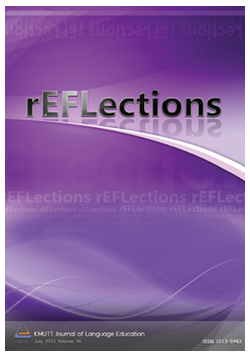The Relationships among EFL-Teacher Trainee Metacognitive Awareness, Instructional Beliefs, and Instructional Practices Regarding Reading Strategies
Main Article Content
Abstract
Two self-report instruments, the SORS-EFL - the adapted version of the revised Survey of Reading Strategies (Mokhtari & Sheorey, 2002) by Zhang and Wu (2009) - and a reading lesson plan, were designed to determine the extent to which 31 EFL teacher trainees used reading strategies while reading academic materials in English, what they believed about the necessity of reading strategy instruction, and what types of reading strategies they employed in their 50-minute-lesson plan. The results revealed that, as a whole, reading strategies were both used and believed in at a high level. The teacher trainees, however, employed reading strategies in the 50-minute-lesson plan to quite a limited extent and with variable frequency. The correlation analysis suggests a positive relationship between their reading strategy use and their beliefs about the necessity of reading strategy instruction; however, their employment of reading strategies in the lesson plan had no significant correlation with either their use of strategies or their beliefs in them. Pedagogical implications of the research for the field of EFL teacher education are discussed. Specifically, this study highlights the importance of training EFL teachers in effective reading strategy instruction in classroom practice as an integral syllabus element in the design of reading methodolog y courses in EFL teacher professional development programs.


